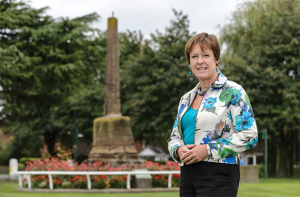 Parliament is due to resume after the summer recess on the day Caroline Spelman meets EG, so when the 57-year-old MP zooms into the car park of her Midlands office in leafy Solihull in her maroon classic Jaguar, she has plenty on her mind.
Parliament is due to resume after the summer recess on the day Caroline Spelman meets EG, so when the 57-year-old MP zooms into the car park of her Midlands office in leafy Solihull in her maroon classic Jaguar, she has plenty on her mind.
Not least HS2: her nearby constituency of Meriden, the epitome of Middle England, will be bisected by the high-speed rail link, and Spelman is clearly uncomfortable about publicly endorsing a project that has aroused much local hostility.
At one point she catches herself saying “if” in relation to the £50bn transport scheme and rapidly corrects herself. She is happiest talking about the benefits that the interchange station, closer to her constituents, will bring: “Coventry was initially resistant to HS2 because they were cross it wasn’t going to stop in Coventry, but they’ve now realised that the interchange station is equidistant between Birmingham and Coventry and actually it’s on the west side of Coventry, where there are a lot of brownfield sites. They are now beginning to see the opportunity that could come to them with strategic development and good road connections.”
Talk of roads leads on to the motor industry, a major part of the West Midlands psyche and contributor to the regional economy.
“It’s difficult to describe to people who don’t live here, but if I park my car in the supermarket car park, sure as not someone will come along and stroke the bonnet and say, ‘I used to make these, Mrs Spelman’. It’s an old car, but the pride in making stuff is still present.”
Spelman is delighted by the renaissance in engineering in the region, but concedes that skills deficiencies continue to be an obstacle. She is cool on whether the new West Midlands Combined Authority will be a positive force: “I think it can work if they [the local authorities] want it to. If it’s imposed on them, as was the case with the RDA, I don’t think it will work. They’re making a choice.”
Her biggest beef is with the (in her view) disproportionately large influence (Labour-controlled) Birmingham wields in the region. She is fond of quoting Sir Bob Kerslake’s observation from the independent report he published on the local authority last December – that its size is “both a badge and a barrier”.
Birmingham’s dominance, she suggests, is an issue when it comes to developing a Midlands Powerhouse. “The surrounding authorities could be forgiven for saying, ‘Ooh, do we want to join up with that?’” she says.
At present a backbench MP, Spelman, who fought her way into Meriden in 1997, is mindful of the issues facing the average voter. Her constituency includes Chelmsley Wood, a large council-owned housing estate, which in 2006 embarked on a £1.8bn redevelopment with Bellway Homes, a project Spelman suggests could be replicated in other areas facing the need to renovate council homes.
She is no stranger to the planning issues that surround housing. Back in 2010, as secretary of state for the environment, she worked with planning minister Bob Neill on creating the National Planning Policy Framework.
She describes coffee-fuelled days and nights condensing the existing canon of planning legislation into a compact form. “OK, we got a bit of flak at the beginning,” she admits, “but the proof of the pudding is in the eating and the system is in place. I think it really did make a difference.”
She seems genuinely surprised when EG points out that difficulties with the planning system remain an issue for the property industry and confesses that, two months after its publication, she has yet to read “in detail” the government’s Fixing the Foundations policy paper, which includes a chapter that essentially tweaks the previous planning reforms.
However, she approves of what she perceives to be a holistic response by government: “Trying to raise wages by upskilling and improving productivity and getting employers to pay a living wage is part of this movement towards marrying up the need to build more housing with people’s ability to buy it.”
Earlier this year, Spelman took on a new role, as second church commissioner. Although she does not get involved in the day-to-day aspects of the body’s property assets, such as the proposed £125m sale of the Church’s remaining 10% in Newcastle’s Metrocentre, any property-related issues that could cause political ructions are flagged with her. “So if there’s a proposed development on church land which is causing controversy in a local area, that will be brought to my attention,” she explains.
“This role is an opportunity to give back to an institution for which I have a high regard and which needs help,” adds Spelman, a long-standing member of the Anglican church. She maintains that her faith is very important to her and indeed the reason she entered politics: “It might sound a bit strange in a secular world, but I feel it’s a vocation.” And with that Spelman jumps into her Jag for the 111-mile drive to Westminster.
Caroline Spelman – CV
Education
Herts and Essex Girls’ Grammar School
London University (European Studies)
1997-present MP for Meriden
2003-2004 Shadow secretary of state for the environment
2004-2007 Shadow secretary for communities and local government
2007-2009 Chairman of the Conservative party
2009-2010 Shadow secretary for communities and local government
2010-2012 Secretary for environment, food and rural affairs
2015-present Second church commissioner
Personal life
Married with three children. She plays tennis, hockey and chairs the parliament choir.
Caroline Spelman on…
… the West Midlands “I find people very welcoming, especially as a woman. I think it’s a good environment for women in all professions: there are loads of female entrepreneurs in the West Midlands.”
… her Meriden constituency “It’s a very diverse area. I have three of the most deprived wards in the country, where 40,000 people live. But I’ve also got some of the wealthiest wards and everything in between, so we’re rural, urban and suburban.”
… the Midlands powerhouse “The actual engine room of the region sits pretty much on the border with the East Midlands. To call it a Midlands powerhouse allows more East Midland authorities to join in future – if they want to.”
… Birmingham and the West Midlands Combined Authority “London is broken into boroughs; Birmingham is not. That’s what has made it difficult for the surrounding authorities and that’s why they have been reluctant to join up in the way that Greater Manchester has done, but they’ve just taken the plunge.”
… the West Midlands economy “I think it’s noticeable since the downturn that the West Midlands has hit another gear. The catalyst was the push by the car manufacturers to export their way to recovery. It has been hugely successful.”
…HS2 “Whichever way you cut it, it’s probably going to have to happen. I don’t underestimate the difficulty and disruption [locally] this is going to bring.”
… housing “For too long people have waited for someone on high to tell them how many houses they can have and where they can go, then they kick against it and then [the houses] do or don’t get built.”
… planning reform “The designation of ‘appropriate development’ was highly subjective. So we decided that we needed to put something more solid at the heart of planning legislation.”
… Sunday trading “As a constituency MP I was unaware of the demand for extending the Sunday trading rule and think we have a good compromise at the moment.”











